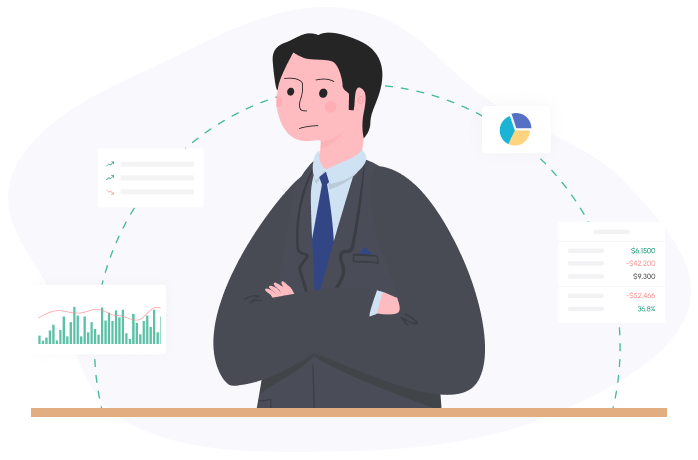
Cash flow budgeting is a tool that businesses can use to help improve cash flow and reach their future goals. But what exactly is a cash flow budget and how does it work? Let’s look at the different budgeting methods and helpful tips for creating your budget.
What is a Cash Flow Budget?
Cash flow budgeting is the process of estimating your business’s cash flow over a period of time. The purpose of budgeting is to see whether your business is generating enough income to maintain operations over that timeframe.
Your cash flow budget can also help you use your cash more effectively. For example, if you estimate that you will have a cash surplus at the end of the budgeting period, you can reinvest that money to help your business grow.
Types Of Business Budgets
A business can't run without cash. Budgeting helps businesses allocate their money in strategic ways to support operations and work towards growth. Businesses may have a wide range of budgets, including:
Operating Budget
An operating budget includes all expenses and revenues over a specific period of time (such as a quarter or year). Businesses use this budget to plan out their operations.
Operating budgets include both variable and fixed costs as well as operating expenses.
Using these figures, businesses can estimate their net profit percentage and net income.
Master Budget
A master budget is a more comprehensive financial planning tool. It includes cash flow budgeting as well as other budgets, financial statements and the company’s financial plans.
Master budgets are created by the company’s budget committee and led by the budget director. The purpose of a master budget is to provide an overview of the company’s finances and can often be used as a planning tool for operations.
Capital Budgets
Businesses use capital budgeting to evaluate the potential of a big investment or project. For example, if a business is considering building a new plant or investing in an outside venture, they would use capital budgeting to help determine whether the proposal should be approved.
Businesses can use several capital budgeting methods to determine the feasibility and profitability of an investment or project.
Finance Budget
Along with cash flow budgeting, businesses also create a finance budget. Financial budgets are essential to every business because they outline the company’s strategy for:
- Cash flow
- Managing its assets
- Expenses
- Income
Financial budgets allow the organization’s finance and business leaders to see where and how the company is making and spending money.
Strategic Budgets
With strategic budgeting, businesses create long-range budgets that span more than a year. The goal of a strategic budget is to help the business create a plan for achieving their future goals, such as expanding into a foreign market or investing in the research and development of a new product.
Budgeting Methods To Consider
Along with different types of budgeting, there are different methods for budgeting. These methods can be applied to cash flow budgeting, finance budgeting and more.
Activity-based Budget
Activity-based budgeting is another common method for budgeting. While it's typically associated with businesses in the manufacturing sector, activity-based budgeting can be used by many types of businesses.
The concept is simple:
- The company assesses its main activities and identifies its main drivers of revenues and costs.
With this budgeting method, the focus is on the organization’s main activities that generate revenue and not administration or overheads.
Activity-based budgets can be helpful in assessing the profitability and pricing of different business activities or products.
Incremental Budget
The incremental budgeting method focuses on making small changes from the budgeted or actual results from the previous period. It’s one of the quickest and simplest methods of budgeting, and it’s ideal when very little is changing in your business or its environment.
Value Proposition Budget
Also known as priority-based budgeting, a value proposition budget analyzes and justifies the value of each expense. The purpose of this budgeting method is to pinpoint where the business should be spending money to generate a positive return.
Zero Based Budget
Zero based budgeting is more complex, but it can be a valuable planning tool if a business is faced with a crisis.
This budgeting method looks at every detail on each account for every month of the budgeting period. Every cost requires a justification.
One advantage of this type of budgeting is that it helps businesses reduce discretionary spending. Businesses can see which expenses are really important and which ones can be either delayed or eliminated entirely.
The biggest issue with zero based budgeting is that it requires quite a bit of work and regular discussions with key members of the business.
How To Create A Cash Flow Budget?
Cash flow budgeting is an important tool in not only planning your operations but also in helping secure financing for your business when needed.
To engage in cash flow budgeting, follow the steps below:
Determine Your Budgeting Timeframe
First, set the timeframe for your cash flow budgeting. Your timeframe can be:
- Weekly
- Monthly
- Quarterly
- Annually
Estimate Sales Units and Income
The next step is to estimate sales units or the number of clients for your budgeting timeframe. Then, multiply your sales units or clients by the actual or average price per unit. This figure will be your estimated sales income.
Estimate the Timing of Your Income
For most businesses, there is a delay between the time of sale and when the money lands in your bank account.
This step estimates when your sales income will actually be paid and takes into account credit card payments, cash payments and deposits.
Calculate Expenses
Now that you’ve estimated your sales income and when you will receive that income, it’s time to look at your expenses.
- First, identify and add up all expenses that will be paid during your budgeting period.
- Next, separate these expenses into two categories: fixed and variable costs.
Fixed costs are expenses that will always be the same regardless of the situation, such as your rent payment. Variable costs may change depending on the situation. These can include raw materials.
Determine Whether You Have a Surplus or Deficit
The next step in cash flow budgeting is to work out whether you have a surplus or deficit for your budgeting period. If your calculations show that you’re in a deficit, you can consider how you will overcome the issue.
How Does It Improve Cash Flow?
Cash flow budgeting can help improve cash flow by allowing you to predict your company’s ability to generate more cash than it spends.
You can use your cash flow budget to make smarter business decisions that will generate more income or reduce expenditures.
Cash Flow Budgeting Tips
Looking for ways to improve your cash flow budgeting? These tips can help.
Prepare a Sales Forecast
When creating a cash flow budget, it’s helpful to also prepare a sales forecast. Having an estimate for your monthly sales income can help you create more accurate budgets because they are based on historical sales data.
Just keep in mind that there will be fluctuations based on market changes, new customers and your actual sales.
Set a Minimum Cash Flow Balance
Calculate how much cash your business will need to have each month to stay afloat. Setting a minimum cash flow balance will help you avoid falling into a cash flow deficit.
Be Proactive to Avoid Future Deficits
Once you have a cash flow budget and you’ve set a minimum cash flow balance, you can start being more proactive about avoiding future deficits. Review your monthly forecasts so that you can take steps early on to avoid cash flow shortages.
Manage Your Cash Flow With A Simple Software
Cash flow budgeting is important for every business. But managing your cash flow can be complicated if you don’t have the right tools.
Software can help automate much of the process and reduce the risk of errors.
Ready To Make Money With Cash Flow Frog? - The Best Cash Flow Forecasting Software
Cash flow budgeting doesn’t have to be time-consuming and overwhelming. Cash Flow Frog can help you create accurate and reliable cash flow forecasts and more in minutes.
Cash Flow Frog integrates with your accounting software, saving time and eliminating errors. Other tools help you manage your cash flow, including scenario planning, planned vs. actual comparisons, projections and more.
Get started for free today!
Related posts:
You may be interested:
New:











